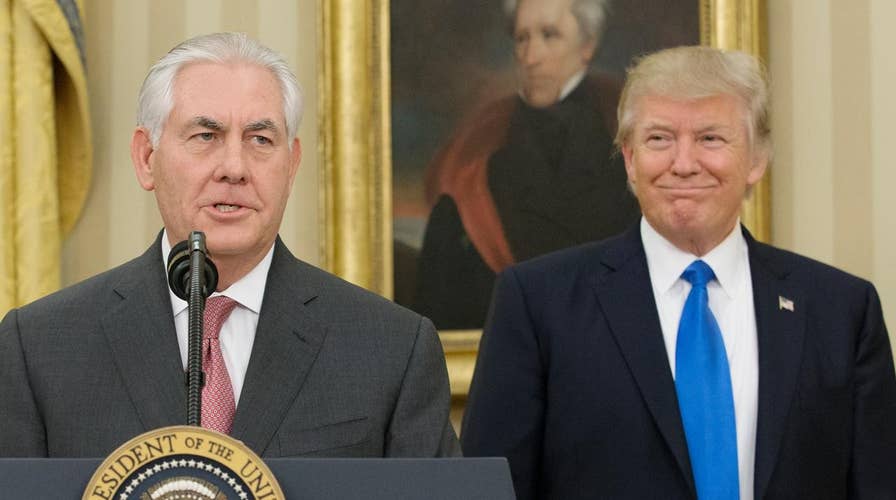Donald Trump and Rex Tillerson: A tenure of tension
A look back on the history of tension between President Donald Trump and Rex Tillerson during his tenure as secretary of state
What surprised Washington foreign policy and political gurus was not Rex Tillerson’s dismissal as secretary of state, which had been rumored for months, but how it was done. President Trump fired his secretary of state in a tweet. It was the Washington equivalent of breaking up with your romantic partner with a Post-it.
“Mike Pompeo, Director of the CIA, will become our new Secretary of State,” the president tweeted at 8:44 a.m. Tuesday. “He will do a fantastic job! Thank you to Rex Tillerson for his service!”
The dismissal stunned Washington. It shouldn’t have. It was obvious that President Trump and Rex Tillerson had different foreign policy views and that the president, understandably, wanted a chief foreign policy adviser like Mike Pompeo, who more closely shares his world view.
The nadir of their relationship apparently came last October, when Tillerson reportedly called his boss a “f------ moron” in private, after the president told national security officials he wanted to dramatically expand America’s nuclear arsenal. One senior White House official said that President Trump, accustomed to flattery and delighted by kowtowing, never forgot the insult.
Whatever the cause, the manner of Tillerson’s firing was mean, petty, and weak – in other words, vintage Donald Trump.
White House officials told the Washington Post that President Trump had asked Tillerson to step aside last Friday. But Steve Goldstein, the State Department under secretary for public diplomacy and public affairs, said that his boss had not spoken to the president about the decision in advance and was unaware of the reason for his dismissal. The White House then fired Goldstein.
The Wall Street Journal’s version of the chaos-du-jour was that the White House called Tillerson at 2 a.m. local time in Africa and told him to come home a day early, without telling him that he was being dismissed. The Journal said that White House Chief of Staff John Kelly “repeatedly urged Mr. Tillerson to resign, but Mr. Tillerson refused, saying he wanted to hear it from president, said a senior administration official.”
Tillerson learned of his firing from Tuesday morning’s tweet, the Journal reported.
In truth, few tears were shed in Washington over Tillerson’s dismissal. Talking to reporters, President Trump said that he and his secretary of state “disagreed on too many issues to work well together.”
“We were not really thinking the same,” the president said. “Really, it was a different mindset, a different thinking.”
President Trump, for instance, thinks the Iran nuclear agreement is “terrible,” the “worst deal ever.” Tillerson and Defense Secretary Jim Mattis lobbied hard to prevent their boss from trashing it. Tillerson wanted to work with allies on climate change. President Trump did not. But no area of disagreement was more profound than their dispute over how to handle Russia.
While Tillerson – ExxonMobil’s former CEO – came to office a little over a year ago eager to work with his old negotiating partner, Russian President Vladimir Putin, he gradually became convinced that Putin had little interest in working with America.
For example, British Prime Minister Theresa May announced Monday that it was “highly likely” that the Kremlin was responsible for attacking a former Russian double agent Sergei Skripal and his daughter in Salisbury, England, with a Novichok nerve agent. The White House supported Britain but did not echo May’s attribution for the attack.
Later that day, Tillerson, by contrast, insisted that Skripal’s poisoning “clearly came from Russia” and would “certainly trigger a response.” Given this timeline, his firing seems an exceptional coincidence.
Social media and journalists drew the inevitable conclusion. “Rex Tillerson Gets Fired the Day After He Criticized Russia,” a New Yorker headline screamed, perhaps confusing coincidence with causation.
“Good on him” for backing Britain and explicitly blaming Russia for the attack, John McLaughlin, the former deputy CIA director told reporters.
Yet while praising what he called Tillerson’s “sensible views,” even McLaughlin said he was puzzled by Tillerson’s failure to adequately staff the State Department and understand that to engage effectively in Washington bureaucratic battle he would need a professional, highly motivated staff. Tillerson’s draconian budget cuts and failure to appoint people to key posts severely wounded him, McLaughlin said.
Tillerson attacked Russia in his farewell statement at the State Department. “Much work remains to respond to the troubling behavior and actions on the part of the Russian government,” he said.
Then the fired secretary of state thanked his staff and his colleagues. But he was silent on the man who will soon no longer be his boss – the president of the United States.









































